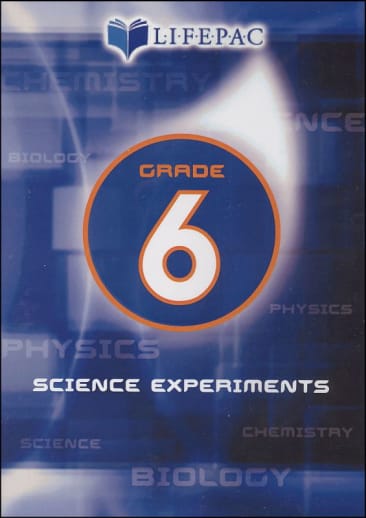Supplement your 6th Grade Science LIFEPACs with this fun-to-watch DVD! Does your child enjoy science? Does your child love learning about science experiments? If so, don't miss this DVD when you are ordering LIFEPAC 6th Grade Science. Science experiments utilizing readily available materials make the planning process easy. Students are led step-by-step through the LIFEPAC experiments and science projects by Stanley the Scientist. Concepts such as plants and photosynthesis, basic physics, basic chemistry, and biology are covered. LIFEPAC Science is a comprehensive, basic homeschool curriculum intended for the study of the physical universe that God created. The program targets observation skills by delivering assignments and experiments through the structured and organized framework of the LIFEPAC curriculum. This educational science DVD is an ideal, non-messy way to teach your 6th grader about scientific experiments. They will be delighted by the things they see, and this Alpha Omega curriculum DVD is a wonderful complement to LIFEPAC 6th Grade Science. So don't delay. Order 6th Grade Science Experiments on DVD from Alpha Omega Publications today!
Science Experiments Grade 6 DVD
SKU
008536
ISBN
9780740307317
Grade 6
These icons are designed to help you quickly understand and learn important information about our products.
Teaching Method
Traditional
Teacher-centered curriculum commonly used in classrooms that may include a text, teacher manual, tests, etc.
Charlotte Mason
A methodology based on the work of a 19th century educator who maintained that children learn best from literature (Living Books), not textbooks.
Classical
A methodology based on the Latin Trivium (three stages of learning), including the grammar stage (memorization and facts), logic stage (critical thinking), and rhetoric stage (developing/defending ideas).
Unit Study
A thematic or topical approach centered around one topic that integrates multiple subject areas.
Montessori (Discovery)
A methodology based on the work of a 20th century educator that emphasizes student and sensory-driven discovery learning and real-life applications.
Other
Other methodologies
Religious Content
Secular
Contains content contrary to common Christian beliefs (i.e. evolution).
Neutral
Avoids religious or theoretical topics or presents multiple viewpoints without preference.
Christian/Religious
Faith-based or including instructional religious content.
Learning Modality
Auditory
Learns through listening, talking out loud or reading out loud.
Visual
Learns through seeing, prefers written instructions and visual materials.
Kinesthetic/Tactile (Hands-On)
Learns through moving, doing and touching.
Multi-Sensory
Curriculum that employ a variety of activities/components.
Presentation
Sequential
Curriculum progresses through well-defined learning objectives. Emphasizes mastery before moving to the next topic.
Spiral
Topics and concepts are repeated from level to level, adding more depth at each pass and connecting with review.
Conceptual/Topical
Focus is on the “why,” often with a unifying concept as well as specific skills; coverage may be broader.
Teacher Involvement
Low Teacher Involvement
Student-led materials; parent acts as a facilitator.
Medium Teacher Involvement
A mix of teacher-led time and independent student work.
High Teacher Involvement
Teacher-led lessons; may utilize discussions, hands-on activities and working together.
Additional Materials Required
No other materials needed
Everything you need is included.
Other Materials Required
There are additional required resources that are a separate purchase.
Other Materials Optional
There are additional resources mentioned or recommended but are not absolutely necessary.
Consumable
Consumable
Designed to be written in; not reusable.
Non-Consumable
Not designed to be written in; reusable.
Our Price
$20.00 $20.00 $18.95
Rainbow Savings: $1.05
Description
Publisher's Description of Science Experiments Grade 6 DVD
Category Description for LIFEPAC Science Experiments Videos & DVDs
A helpful addition to the excellent material covered in the LIFEPAC series are the Science Experiment DVDs. Your student can view some of the more involved experiments without safety concerns, and you can avoid the expense of special equipment and chemicals. Plus, the experiments always work! The DVDs feature the content of the Switched-on-Schoolhouse version of the science curriculum, so if you have the SOS version of any of the Science programs, you do not need to purchase an additional DVD.
Details
| Product Format: | DVD |
|---|---|
| Grade: | 6 |
| Brand: | Bridgestone |
| ISBN: | 9780740307317 |
| EAN/UPC: | 095163901028 |
| Length in Inches: | 7.5 |
| Width in Inches: | 5.25 |
| Height in Inches: | 0.5 |
| Weight in Pounds: | 0.15 |
| Publication Date: | 1/4/2013 |
Videos
Reviews

